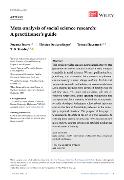Meta-Analysis of Social Science Research: A Practitioner’s Guide

Publication date
2024Published in
Journal of Economic SurveysVolume / Issue
38 (5)ISBN / ISSN
ISSN: 0950-0804ISBN / ISSN
eISSN: 1467-6419Metadata
Show full item recordCollections
This publication has a published version with DOI 10.1111/joes.12595
Abstract
This paper provides concise, nontechnical, step-by-step guidelines on how to conduct a modern meta-analysis, especially in social sciences.We treat publication bias, p-hacking, and heterogeneity as phenomena meta-analysts must always confront. To this end, we provide concrete methodological recommendations. Meta-analysis methods have advanced notably over the last few years. Yet many meta-analyses still rely on outdated approaches, some ignoring publication bias and systematic heterogeneity. While limitations persist, recently developed techniques allow robust inference even in the face of formidable problems in the underlying empirical literature. The purpose of this paper is to summarize the state of theart in a way accessible to aspiring meta-analysts in any field. We also discuss how meta-analysts can use advances in artificial intelligence to work more efficiently.
Keywords
meta-analysis, publication bias, p-hacking, artificial intelligence, model uncertainty
Permanent link
https://hdl.handle.net/20.500.14178/2704License
Full text of this result is licensed under: Creative Commons Uveďte původ-Neužívejte dílo komerčně-Nezpracovávejte 4.0 International






